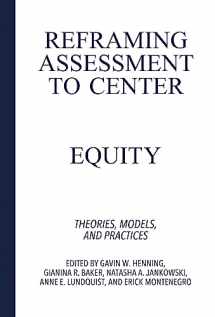
Reframing Assessment to Center Equity
Book details
Summary
Description
This book makes the case for assessment of student learning as a vehicle for equity in higher education. The book proceeds through a framework of "why, what, how, and now what." The opening chapters present the case for infusing equity into assessment, arguing that assessment professionals can and should be activists in advancing equity, given the historic and systemic use of assessment as an impediment to the educational access and attainment of historically marginalized populations.
The "what" chapters offer definitions of emerging terms, discuss the narratives of equity in evidence of student learning, present models and approaches to promoting equity, and explore the relationship between knowledge systems and assessment practice.
The "how" chapters begin by progressively moving from the classroom to the program, then beyond the program level to share examples from student affairs. Subsequent chapters address the problem of equitable access to STEM fields; culturally responsive practices within the context of community colleges; the ongoing work of culturally situated assessment practices in Historically Black Colleges and Universities; and the role of technology-enabled assessment as a possible tool for equitable assessment.
The final two chapters in the book address the "now what", providing a way for assessment professional to develop individual awareness within their practice as a next step in the equity journey, and a conceptual framework to anchor equity in their work.


We would LOVE it if you could help us and other readers by reviewing the book
Book review



